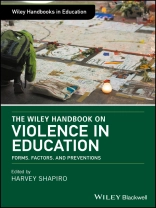In this comprehensive, multidisciplinary volume, experts from a wide range fields explore violence in education’s different forms, contributing factors, and contextual nature.
With contributions from noted experts in a wide-range of scholarly and professional fields, The Wiley Handbook on Violence in Education offers original research and essays that address the troubling issue of violence in education. The authors show the different forms that violence takes in educational contexts, explore the factors that contribute to violence, and provide innovative perspectives and approaches for prevention and response. This multidisciplinary volume presents a range of rigorous research that examines violence from both micro- and macro- approaches.
In its twenty-nine chapters, this comprehensive volume’s fifty-nine contributors, representing thirty-three universities from the United States and six other countries, examines violence’s distinctive forms and contributing factors. This much-needed volume:
* Addresses the complexities of violence in education with essays from experts in the fields of sociology, psychology, criminology, education, disabilities studies, forensic psychology, philosophy, and critical theory
* Explores the many forms of school violence including physical, verbal, linguistic, social, legal, religious, political, structural, and symbolic violence
* Reveals violence in education’s stratified nature in order to achieve a deeper understanding of the problem
* Demonstrates how violence in education is deeply situated in schools, communities, and the broader society and culture
* Offers new perspectives and proposals for prevention and response
The Wiley Handbook on Violence in Education is designed to help researchers, educators, policy makers, and community leaders understand violence in educational settings and offers innovative, effective approaches to this difficult challenge.
เกี่ยวกับผู้แต่ง
Harvey Shapiro is a faculty member in the Department of Education at Northeastern University.












